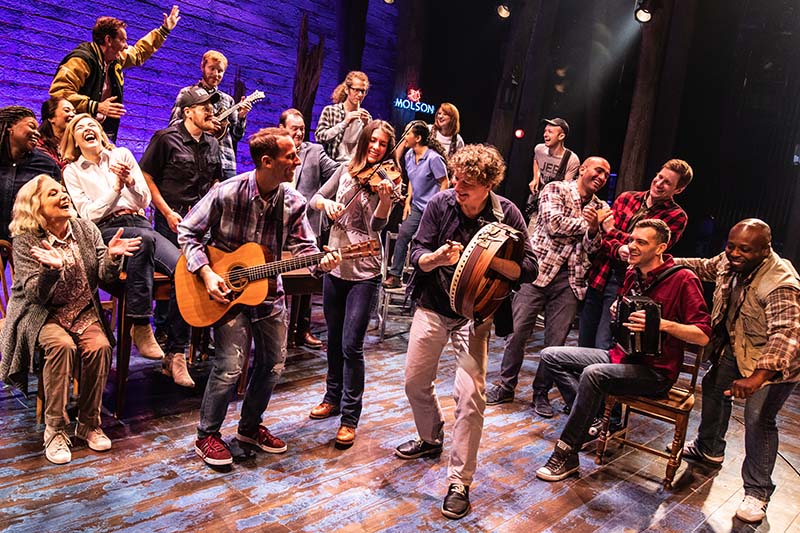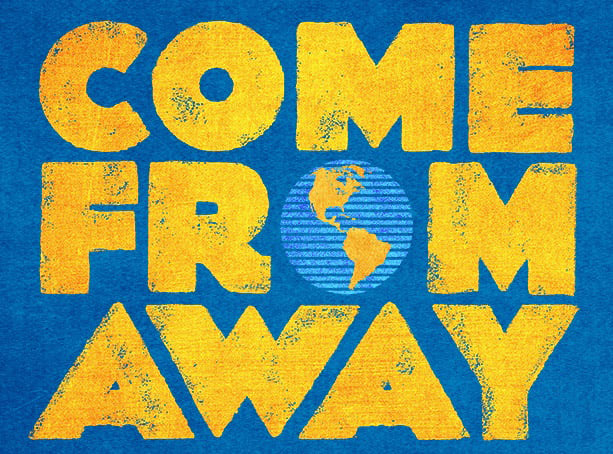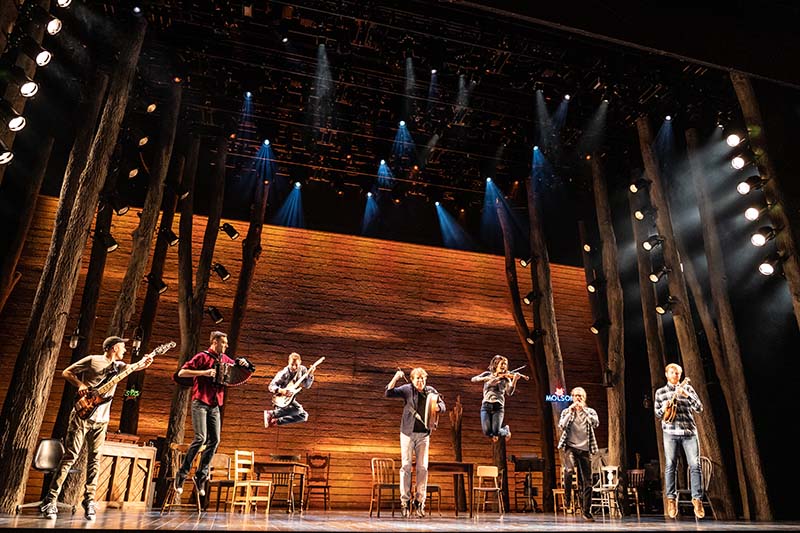
Courtesy photo
I remember the uncertainty and suddenness of it all.
The news was constant, but also slow to provide a full picture. There were two planes that hit the Twin Towers – that was clear from the near constant loop of imagery my classmates and I watched on a television outside of class after our teacher abruptly canceled it. Maybe the other plane crashes in the eastern parts of the United States were related, too? We knew the world was changing, but we didn’t know anything.
Last March, there was a somewhat similar unfolding of events. We knew something was happening, but not what, not when and not how it would unfold. And the production schedule at the Walton Arts Center is but one example. Midway through its run, the center abruptly canceled its production of “Anastasia” and announced they were suspending all shows – but just for three weeks.

“Come from Away”
Where: Walton Arts Center, Fayetteville
When: 7 p.m. Oct. 27; 1:30 and 7 p.m. Oct. 28; 8 p.m. Oct. 29; 2 and 8 p.m. Oct. 30 ; 2 p.m. Oct. 31
Tickets: 479-443-5600 or waltonartscenter.org
Note: All attendees most provide proof of full COVID-19 vaccination or provide a negative test. Details can be found on the venue’s COVID policies page.
Slowly, we learned the magnitude of the situation. The WAC was closed for not weeks, but months. And when it did reopen, the first shows back were different than we’d ever seen before – the events were smaller, distant and required us to wear masks.
It would be a full 19 months before a Broadway series show would return to the stage. So, were emotions high at the Walton Arts Center last night (Oct. 26) because the performance was the first Broadway show in a year and a half, or because the show, “Come from Away,” took us on an emotional rollercoaster as it explored the days immediately following 9/11?
Having watched the first performance, I’d say the answer is close to 50/50. Masks were required of patrons, as was proof of vaccination or a recent negative COVID-19 test. But that didn’t seem to slow anyone down, and the venue was quite full. The venue’s impassioned pre-show plea to keep masks on for the safety of guests and performers must have worked. General mask usage has been falling in Fayetteville, even with a mandate still in place, but I didn’t witness anyone not wearing theirs inside the venue.
“Come from Away” frames the 9/11 story around several real-life events that took place in the immediate aftermath of the terroristic attack. With planes crashing into landmarks, the United States took the unprecedented – hey, there’s that word! – step of closing its airspace. Planes that were flying over the states were immediately diverted. But instead of flying into major cities, planes were routed into rural communities like Gander, a town of about 9,000 in Newfoundland, Canada.
The mayor of the town had a quick but somber answer for why in the musical – “because if anything goes wrong, we have less people to lose,” he told the audience. The idea for the musical was spawned around the time of the 10th anniversary of the attack, then developed on regional theater stages. It jumped to Broadway in 2017 and was nominated for seven Tony Awards.

Courtesy photo
Written by Canadian duo Irene Sankoff and David Hein, the musical is told from two primary points of view – passengers unexpectedly diverted to a place they had no intention of going and the townspeople who readily accepted them. These passengers had a fascinating and terrifying perspective on the situation. They were sad to be isolated from their families but feeling lucky it wasn’t their plane that was hijacked. The simple townsfolk of Gander – and nearby communities who also took in these temporary refugees – uprooted their lives and donated everything they could.
In one such example, there’s a scene where a Black man discusses his fear of going into backyards and collecting barbecue grills without asking. They mayor told him to do so, and said the residents wouldn’t mind. And instead of getting accosted (or worse) by the rightful owners of the grills, the man is offered a cup of tea for his troubles. It’s both an exploration of the racial tensions of the situation and a joke about the niceness of Canadians. Much of the musical operates on this narrow line between interpersonal tensions and human kindness.
I don’t know how much of this true story is 100% accurate or embellished for the stage. Did the townsfolk really combine for a big barbecue using the grills of every resident? Did the local animal rescue really help with a rare ape being transported between zoos? (Update, I found this answer: Yes!) Did a hurricane really threaten to suspend flights again after they had restarted and passengers were leaving? (Also yes.)
Beyond these community-wide acts of kindness and secondary near disasters, I think the show does a great job of talking about the micro-connections of our human experience. For instance, a school administrator who has a son that’s a firefighter connects with a passenger who is worried about her son, a New York City fireman. And I was touched by a moment where a man having trouble communicating with a couple from Africa digs through their Bible, knowing that even if he couldn’t read anything in their native tongue, he could at least understand the numbering system. He chose one of his own favorite verses about troubling situations and literally pointed to it as a way of establishing a connection.

Courtesy photo
I use “man” and “couple” loosely because many of the characters in “Come from Away” are nameless. Each of the actors play multiple roles, often switching while onstage as action focused our attention elsewhere. Even named characters like rookie reporter Janice (played by Julie Knitel) come and go, with the actress behind the role transforming into a flight attendant by donning a blue vest and hat. The mayor of Gander, Claude (played by Kevin Carolan), becomes the mayor of many other towns by putting on different hats or glasses.
His transformation between these various mayors is one of the show’s funniest moments. And, yes, this is a funny 9/11 show. The show is fast paced, with many short scenes, no intermission and a run time of under 100 minutes. It’s a sparse set with energetic music played by a live rock band and characters that move quickly between accents and costumes. The show can be a lot of fun.
There is also sadness, grief, stress, confusion and love lost – but also love found. It is our worst, as characters yell accusations at a Muslim man who wants a location for his prayers. It is also our best, as the townsfolk and nearly 7,000 passengers from 100 countries found connections.
The show itself concludes via a 10th anniversary reunion in Gander. We do not know how we’ll think back on our present events 10 years from now, much less the 20 that have passed since the events of 9/11.
But we do need reminded sometimes that humans can be decent, kind and generous. When news continues to come at us fast but is slow to show change, that’s a powerful reminder indeed.
Disclosure: Walton Arts Center is a financial supporter of the Fayetteville Flyer.

